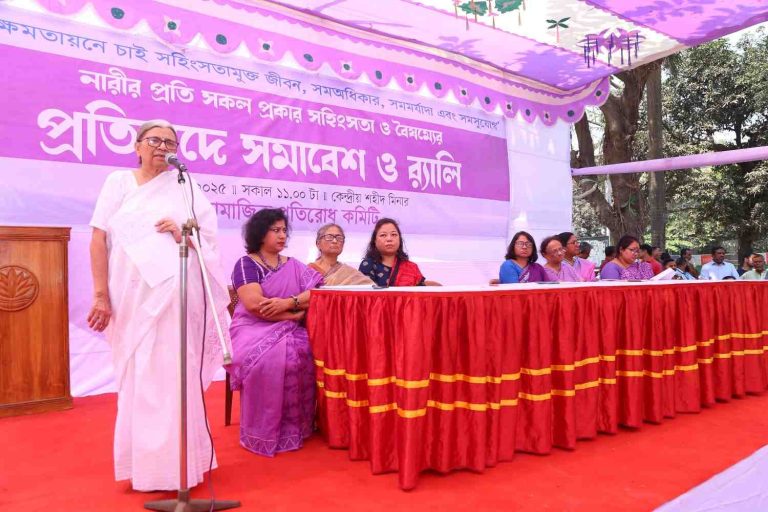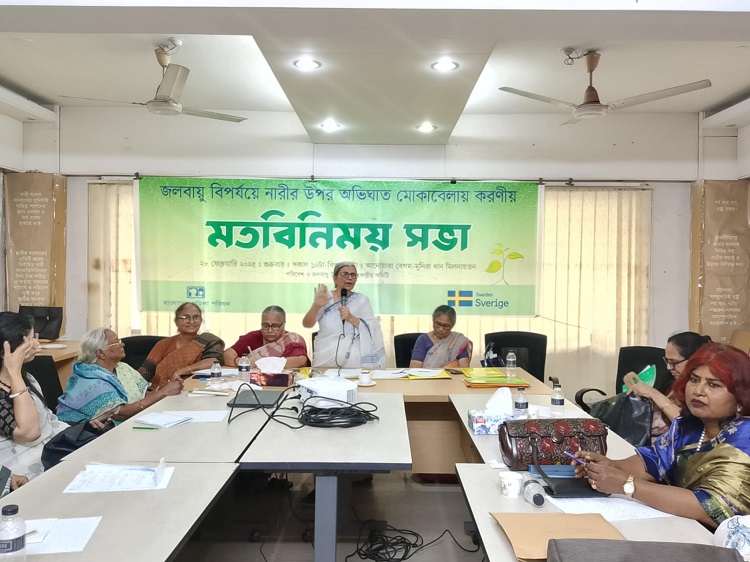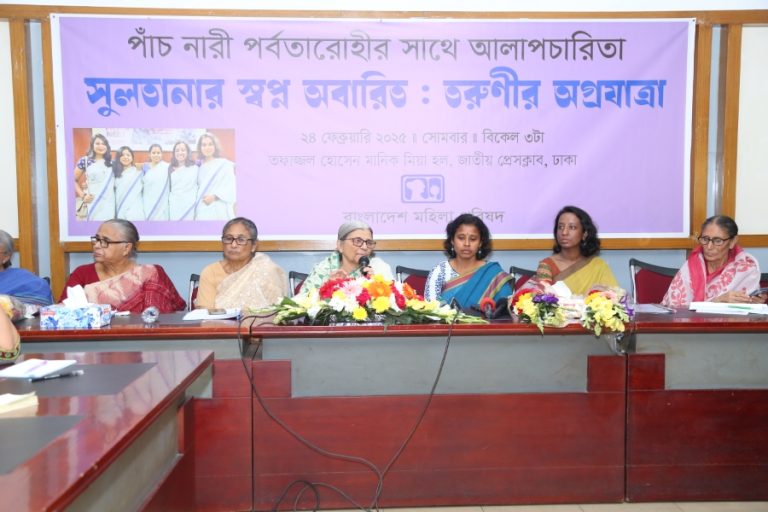On the afternoon of November 18, 2024, a roundtable discussion focusing on “The Constitution of Bangladesh and Women” took place at 3 PM. This event was hosted by the Bangladesh Mahila Parishad (BMP) and held at the Anwara Begum Munira Khan Auditorium, located in Sufia Kamal Bhavan, 10/B-1, Segunbagicha, Dhaka. The discussion was presided over by Dr. Fauzia Moslem, the President of BMP. General Secretary Maleka Banu opened the event with a welcoming speech, while Advocate Masuda Rehana Begum, the Joint General Secretary, presented the position paper. The discussion saw contributions from notable figures, including Dr. Rounak Jahan, a renowned educationist and researcher; Advocate Salma Ali, President of the Bangladesh National Women Lawyers’ Association; Advocate Maksuda Akter Laili, a Supreme Court lawyer; Amit Dashgupta, also a Supreme Court lawyer; and Imran Azad, a Professor in the Department of Law at Bangladesh University of Professionals.
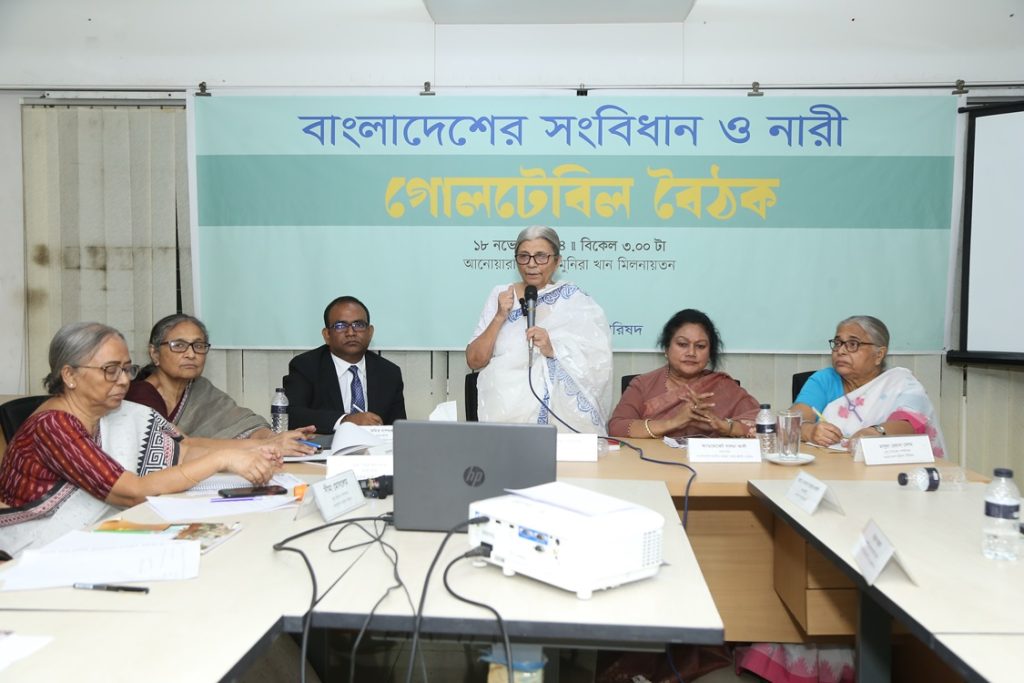
Advocate Masuda Rehana’s position paper addresses the ongoing discrimination against women in Bangladesh, despite constitutional guarantees of equality. It calls for the reform of discriminatory laws in accordance with the ideals established during the Liberation War, aiming for a just and inclusive society. Key recommendations include withdrawing reservations from certain CEDAW articles, implementing constitutional rights fully, fostering a supportive socio-economic climate, ensuring judicial independence, facilitating women’s political participation, and providing equal inheritance or co-ownership of property.
During the discussion, speakers emphasized the importance of amending the current constitution to create a fair state, rather than rewriting it completely. They called for creating gender-sensitive environments, uniform family laws, and reforms to discriminatory laws to ensure equal property rights as outlined in Article 42 of the constitution. The speakers also highlighted the need for implementing measures to prevent violence against women, enhancing legal frameworks for human rights protection, promoting women’s professional freedom, separating the executive and judiciary powers, and abolishing mob justice.
In her welcome address, General Secretary Maleka Banu highlighted that the 1972 constitution of Bangladesh was built on the ideals achieved during the nine-month struggle against Pakistani colonial rule, embodying the aspirations of those who fought in the war. It symbolizes self-respect and serves as a beacon of inspiration, particularly for the women of Bangladesh. However, Maleka Banu noted that the goal of full equality has yet to be realized, emphasizing the importance of identifying key areas to focus on to ensure justice and equality for all marginalized groups, including women.
Dr. Rounak Jahan emphasized the need for submitting recommendations on women’s discrimination at additional platforms beyond existing commissions, suggesting collective action among women’s organizations to tackle issues like the cancellation of women’s quotas and to enforce comprehensive family laws. Advocate Salma Ali highlighted the necessity for stricter enforcement of women-friendly laws to combat human trafficking and domestic violence. She stressed the importance of monitoring state initiatives, based on constitutional provisions, and the establishment of victim-support centers to ensure victim safety.
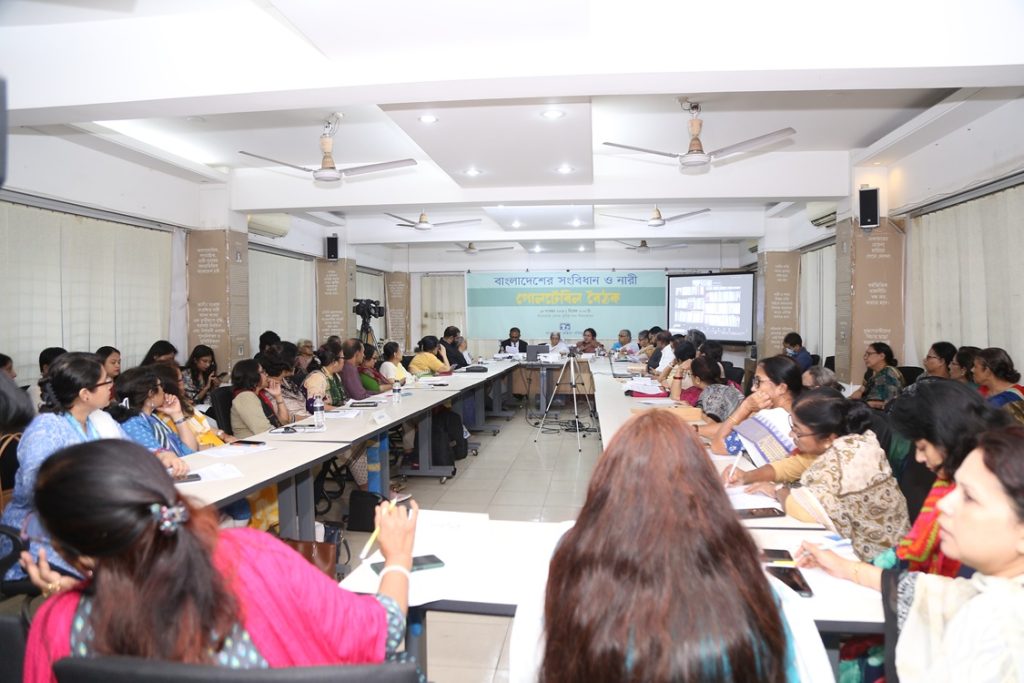
Amit Dashgupta emphasized the ongoing struggle for gender equality, despite its theoretical presence in law, and highlighted biases in Hindu and Muslim family laws influenced by religious doctrines. He called for increased political and social awareness to tackle these issues. Professor Imran Azad discussed the need for clear definitions of family law within the constitution, highlighting it as a political tool to enforce women’s equality and protect disadvantaged groups, in line with Article 28. He also advocated for the recognition of ethnic diversity in the constitutional framework.
The open discussion was participated in by Shahnaz Sumi, Director of the Bangladesh Nari Progati Sangha; Dr. Bishwajit Roy Chowdhury from BRAC; Purabi Talukder, Program Manager at Dhaka YWCA; Falguni Tripura, Coordinator of the Indigenous Women’s Network; Laila Ripa from Nari Maitree; and Barrister A K Rashedul Haque, lawyer at the Bangladesh Supreme Court.
In her concluding remarks, Dr. Fauzia Moslem emphasized the need for constitutional reforms reflecting the changed social and political context, highlighting inclusivity and equality across all ethnicities. She called for securing women’s personal and state rights in protecting the constitution, contributing to visible participation, and acknowledging co-ownership in decision-making, while maintaining secularism and religious neutrality.
The roundtable was attended by leaders of Bangladesh Mahila Parishad, , organization officials, representatives from BRAC, Bangladesh Nari Progati Sangha, Karmojibi Nari, and Nari Maitree, along with journalists. The discussion was moderated by Joint General Secretary Shima Moslem.

